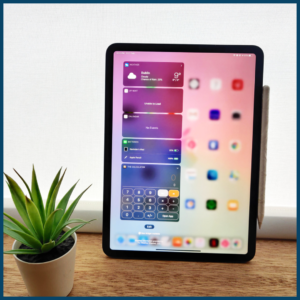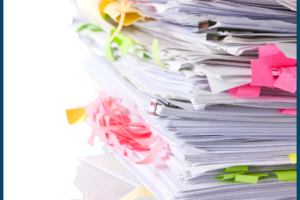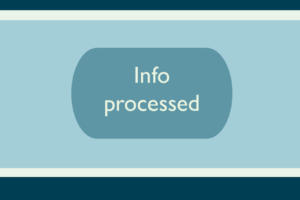
How to Organize Your Magazines, Books, and Other Non-Critical Information
Do you immediately embrace new technology? You buy a new gadget the minute it hits the stores. You volunteer to beta test new software. You look for the latest and greatest app. You download software updates as soon as they are released.
Or, you might be more like me. My cell phone will be five years old in August (2024). I don’t plan to replace it until it completely dies. Similarly, I retain other devices until they completely stop working. I use the same apps and programs until they absolutely have to be updated or replaced.
There are pluses and minuses to each type of person. Immediate embracers buy at a higher price and usually spend more time learning how to use the new tech. Delayed embracers can lose productivity when not upgrading in a timely manner.
Either way there’s tons of information to process each day and some various ways to go about it. In Tired of being surrounded by so much information?, I discussed how to handle email and snail mail. In How to organize your papers and digital information, I covered a basic framework for managing data, with specific examples for physical medical information and digital receipts.
I’d be remiss if I didn’t give examples of how to organize some of the other common types of information.
MAGAZINES
You may receive magazines both in print and in digital formats. The electronic ones are easier to control; if you click on an app to read it or go to a browser, you can close it and not worry if you never finish an article. Here are some options for dealing with any print magazines so they don’t get out of control.
- Choose a boundary to limit the number of magazines you receive each month. The number you set is up to you. Often people who work full-time don’t have time to read more than a few magazines per month. You may consider choosing one professional or work-related magazine and one for personal interest.
- If you’re struggling, ask yourself which magazines you’re actually reading each month and which ones you WANT to read. It’s easy to sign up for something you think you’ll like and later discover you just aren’t as into it as you would have guessed. Try to be honest with yourself and let go of those you never read.
- Set aside a time to unsubscribe to any extras as soon as possible.
- When you have time to read a magazine, recycle it as soon as you’re done. (If you save them for projects, set a boundary for that as well.)
- Set a goal of reading a magazine before the next issue arrives. If the new one arrives and you haven’t read the current one, give yourself a deadline to complete it. That way you prevent them from stacking up.
- Be sure to have a “home” for magazines so you’ll always know where to find them.
BOOKS
Some people love owning books and don’t care if they pile up around the house. If you’re that person, I get it! I love books, too. But books collect dust, are a fire hazard, and can attract mice and bugs. You may realize that your books are causing negative feelings or taking up too much room. Maybe the weight of the clutter is getting to you or your allergies are acting up.
You may have a collection of books in print and electronically. Here are some ideas for managing both:
- Get a library card and start using it. Not only will you reduce the number of books you own, but you’ll support your local library. And it’s free, which means you’ll save money you’d spend on books.
- When you buy books, buy titles you think you’ll read more than once.
- Set a boundary on your books. The best boundary is a bookshelf or two. Once those are full, you must donate old books to make room for new ones. Donate to nursing homes, schools, the library (yep!), or little free libraries you may see around town.
- You may need to set limits on books that are personal versus professional. I no longer purchase physical books for pleasure reading. I check them out of the library.
- Sometimes we keep books because we still want/need to read them. Just a reminder: you’ll never gain that knowledge if you don’t read it. Create a pile of books you haven’t read and plan when you’ll read or donate them.
- Instead of buying a book as a way to remember you want to read it, write down the title. I use Evernote to list books that I’m interested in reading.

Electronic
- The amount of storage space on your device may help you set a boundary, but now, many things are stored in the cloud, which gives us a lot more room. Still, you might consider deleting books after two years if you’ve read them and don’t plan to again.
- If you don’t even finish a title, delete it.
- Consider checking out books electronically. Yes – this is a thing you can do! Go to your library’s website to learn more.
OTHER NON-CRITICAL INFO
Aside from mail, books, magazines, physical medical information, and digital receipts, we all seem to end up with lots of other non-critical information in electronic and print form. For example, you might end up with brochures for your next vacation, bookmarks in your Internet browser to hobby-related articles you want to read, “good ideas” you’ve jotted down, plus text messages, voicemails, and more.
How you handle these is similar, in many ways, to how you handle the more critical items. The main difference is that these often end up forgotten because they don’t have a deadline or urgent timetable. A few thoughts:
- Try to process or deal with each item as it comes in so you don’t have to deal with it later. This will save you a lot of time.
- A lot of information goes out of date quickly and is easy to find again later if/when you need it. Try to limit what you save online, especially.
- Limit the locations where you put things, both paper and electronic. This way it’s simpler to find later and easier to make sure you’re processing things when you have the time to do so.
- Set aside time each week to clear any papers from flat surfaces around your house. You might incorporate this into your mail processing one day, if that helps. You might make it easier by putting on music or having a TV show on in the background — one that doesn’t require your full attention, though, so you can focus.
- Set aside time each week or month to sort through your Internet bookmarks. Delete any old information, the ones you’ve read, or the links that no longer work.
- As you bookmark something to read “later,” organize it into folders so you know what it is. That way even if you can’t clean out those folders often, at least you can go back and find the article you wanted to read.
- If you’ve accumulated information for a specific event, such as a vacation or a project you just finished, delete those items/articles when you’re done. Again, with most information, you can find it or something similar later.
- You can also create your own expiration dates for things, as I talk about here.
Check out these posts referenced in the article for more options to manage your data, along with a fifth bonus article that’s related to this topic:
- Tired of being surrounded by so much information?
- How to organize your papers and digital information
- Do you get overwhelmed by the amount of information you receive each day? Try these solutions!
- Apply These 4 Secret Techniques to Help You Determine the Expiration Date of Papers (& then delete them)
- Overwhelmed by emails? Use THESE 8 Proven Tips.



